Freight bicycle
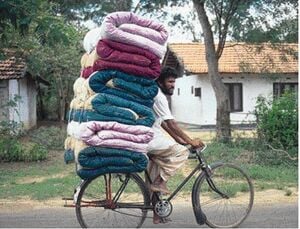
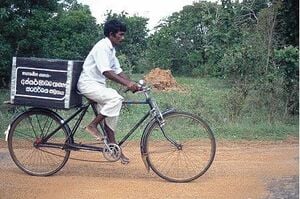
Panniers and luggage carriers can be installed unto regular bicycles, ie to allow use of the bicycle as a freight bicycle.
Pannier installation[edit | edit source]
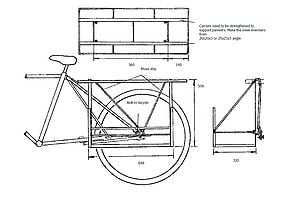
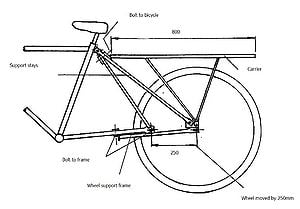
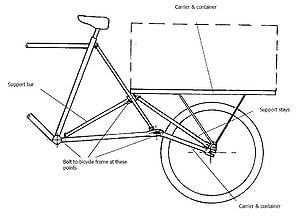
The carrying capacity of the bicycle can be greatly increased by attaching panniers either side of the wheel. However, the loads in the panniers must be reasonably well balanced. Panniers are particularly suited to carrying containers such as used for carrying water.
Panniers may simply be sacks or woven baskets hung from lengths of wood or bamboo fixed across the carrier or may be frames manufactured from wood or steel. They need to be as light as possible.
The design shown is a steel frame, which may be either welded or pinned together so that it can be folded up when it is not in use.
The base and sides may be filled in with wire mesh (weldmesh), wooden slats or canvas type material. The ends can be filled in on fixed panniers but not on fold-up designs.
Luggage carrier installation[edit | edit source]
These low cost adaptations of standard bicycles enable larger and more bulky loads to be carried on an extended rear carrier.
The load that can be carried is limited by the strength of the rear wheel and tyre. A strengthened wheel can be used so that the limiting factor is the load capacity of the tyre.
This particular bicycle adaptation requires; the chain to be lengthened, the brackets for the rear break to be moved, and the brake rods to be lengthened. The frame does not have to be cut or modified in any way.
Construction of a luggage carrier with small (20") rear wheel[edit | edit source]
The advantages of a small rear wheel are; there is more space for the load, the load is lower and easier to balance, the wheel is stronger, and the bicycle is easier to pedal. The main disadvantage is that the smaller wheel does not ride as easily over pumps and potholes.
Further reading[edit | edit source]
- Bicycle Trailers (Practical Action Technical Brief)
- Low-cost Load-carrying Devices: The Design & Manufacture of Some Basic Means of Transport Ron Dennis and Alan Smith ITDG Publishing 1995
- Puncture Prevention Techniques for Low Cost Vehicles Michael Ayre & Alan Smith
- The Impact of Road Condition on Operating Costs of Bicycles, IT Transport, 2004, DFID. https://ittransport.co.uk/index.php?page=publications
- Forum News, IFRTD
A quarterly newsletter looking at the issues of transport with animal power, bridges, bicycles, gender and transport, financing, engineering, sustainable rural livelihoods, and community planning. Forum News is produced four times a year in English, French and Spanish.
Useful contacts and addresses[edit | edit source]
International Forum for Rural Transport and Development - IFRTD 2 Spitfire Studios 67-73 Collier Street London N1 9BE United Kingdom Tel: +44 (0)20 7713 6699 Fax: +44 (0)20 7713 8290 Email: ifrtd@gn.apc.org Website: http://ifrtd.gn.apc.org/ The International Forum for Rural Transport and Development is a global network of individuals and representatives from government, academia, multilateral and bilateral donor agencies, consultancies and technical institutions, national and international NGOs and groups of community organizations in Africa, Asia, Europe and North and South America.
I. T. Transport Ltd. The Old Power Station Ardington, Nr Wantage Oxon OX12 8QJ United Kingdom Tel: +44 1235 833753 /821366 Fax: +44 1235 833753/821366 E-mail: itt@ittransport.co.uk Website: https://ittransport.co.uk/ Consultants in transport for rural development
International Bicycle Fund 4887 Columbia Dr S Seattle WA 98108-1919 USA Website: http://www.ibike.org/index.htm A non-governmental, non-profit, advocacy organisation, promoting sustainable transport and international understanding. Major areas of activity are non-motorised urban planning, economic development, bike safety education, responsible travel and cycle tourism, and cross-cultural, educational programmes.
Pan Africa Bicycle Information Network (PABIN) Website: http://www.ibike.org/pabin/index.htm Working to improve opportunities for bicycle transport and low-cost mobility to improve productivity, the quality of life and the environment in Africa.
Re-Cycle Unit A Global Park Moorside Colchester Essex, CO1 2TW United Kingdom Tel: 0845 4580 852 or 01206 863111 Email: mailbox@afribike.org Website: www.re-cycle.org Re-cycle is a charity whose mission is to collect and ship second hand bicycles and parts to less developed countries. Re-cycle helps to teach local people the skills of how to repair and maintain bicycles, to improve their lives in a sustainable manner.
First African Bicycle Information Office PO Box 1537 Jinja Uganda Tel: 00256-77-620312 E-mail: africa.bike@jessas.de http://www.jessas.de/index.html FABIO (First African Bicycle Information Office) is providing literature and videos on bicycles as sustainable means of transport and is organising national and international seminars on bicycle-awareness. There is a bicycle-workshop and training-centre for youths in assembling and maintenance of bicycles.
Cycling out of Poverty info@cyclingoutofpoverty.com http://www.cyclingoutofpoverty.com/ Cycling out or Poverty is a Dutch organisation engaged in raising funds for bicycle micro credit projects in Africa. Cycling out of Poverty is running 3 projects: in Uganda, Burkina Faso and Ghana.
Jacana Real World Development 1321-B North Carolina Avenue NE Washington, D.C. 20002, USA E-mail: info@jacanaworld.org Website: http://www.jacanaworld.org Jacana has been working on the Build A Better Bicycle (BABB) project. The objective of the BABB project is to commercialise a bicycle designed specifically for use in demanding African conditions. They have an office in Mozambique. Jacana is a member of bicycles for Humanity.
Bicycle Empowerment Network - BEN Namibia PO Box 23150 Windhoek Namibia Tel: +264 61 250 200 Fax: +264 61 225 006 E-mail: michael@benbikes.org.za Website: www.benbikes.org.za/namibia BEN import donated new and secondhand bikes from partner organizations and refurbish them by employing and training local people. They distribute bicycles to community-based organizations (CBOs) whose staff in their work. BEN is a member of Bicycles for Humanity. They are supported by biking for Bikes http://web.archive.org/web/20080303140323/http://www.biking4bikes.com.au:80/
Bicycles for Humanity E-mail: info@bicycles-for-humanity.org Website: http://bicycles-for-humanity.org/ Bicycles for Humanity began in 2005 with the aim of enabling others to raise funds and collect unwanted bicycles to send to reliable partners in developing countries.
Practical Action The Schumacher Centre for Technology and Development Bourton-on-Dunsmore Rugby, Warwickshire, CV23 9QZ United Kingdom Tel: +44 (0)1926 634400 Fax: +44 (0)1926 634401 E-mail: inforserv@practicalaction.org.uk Website: http://www.practicalaction.org